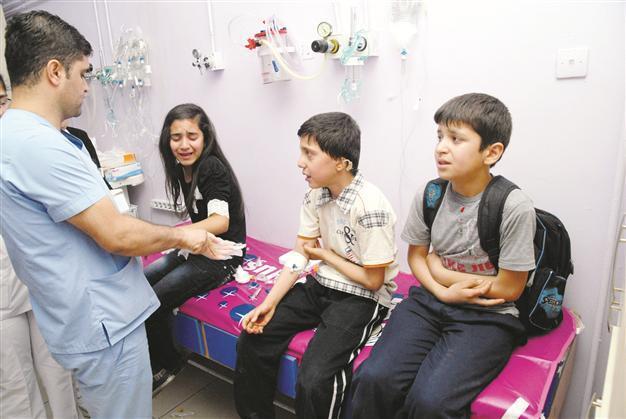Students hospitalized after free milk fiasco
ISTANBUL - Hürriyet Daily News

On the first day of a new government project distributing free milk in state schools, hundreds of students have been put in the hospitals after symptoms of poisoning.
On the first day of a recent government project overseeing the distribution of free milk in state schools, hundreds of students around Turkey were hospitalized after drinking their milk. More than 1,000 students went to hospitals complaining of poisoning in nine cities and a number of towns in Turkey yesterday.Education Minister Ömer Dinçer said the students had not been poisoned, but “had sensitivities to milk,” while Deputy Prime Minister Bülent Arınç claimed that “the students got sick since they drank milk for the first time in their lives, or they drank too much.”
On the other hand, the main opposition Republican People’s Party (CHP) deputy from the southern province of Aydın, Lütfi Baydar, commented on the incident by asking if the milk was purchased from “government partisan” firms.
“A governor said the symptoms stemmed from psychological causes. I am a doctor, and it is the first time I’ve ever heard such a thing,” Baydar said.
A doctor from the Sivas Public Hospital, speaking to the Hürriyet Daily News, said expired milk could be the reason for the mass sickness. Some 600 students in the central Anatolian province of Sivas alone were hospitalized yesterday morning, said Salih Gül, deputy head physician at the Sivas Public Hospital.
“We suggest that the students were made to drink expired milk which had become yogurt-like. Most of the students’ states of health were not that serious, but nearly 30 of them are still on IVs,” Gül told the Daily News yesterday.
However Ali Koyuncu, head of the Milk Producer’s Union and also former Justice and Development Party (AKP) deputy said there was no expired milk, adding that the project had made a 400 million Turkish Lira contribution to the Turkish economy.
“Students might be affected psychologically … There is no such thing as poisoning. There might be logistic or conservation problems, but this is a proper project,” Koyuncu told the Daily News.
Around 300 students in the southeastern province of Diyarbakır were also hospitalized, while a number of students were also affected by milk poisoning in the provinces of Kırıkkale, Sakarya, Antalya, Adana, Edirne and Samsun.
Mustafa Büyük, governor of Sakarya - where 35 students went to hospitals with complaints of food poisoning - said “the children were not used to drinking milk.”
“We distributed milk to 70,000 students, but only 35 students were hospitalized, maybe they were hungry or their metabolism was not used to milk. They have all been discharged from hospitals. Doctors wrote up reports [saying] that it was not poisoning. It shows that our children had not consumed milk for a long time,” Büyük told the Daily News yesterday.
Officials from the Ministry of Agriculture have taken milk samples from schools and announced that the exact reason for the apparent poisoning would be determined after analysis.
A 17-firm consortium won the tender to distribute milk to some 7.2 million school children in Turkey in a tender April 18. The cost of the project is estimated at 74 million liras.
















